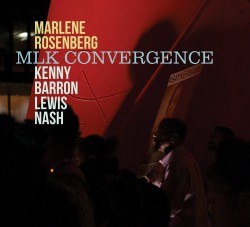MUSIC REVIEW BY Arturo Pepe, Tracce di Jazz (Italy)
The renowned bassist (and composer) Marlene Rosenberg (already appreciated with the likes of Joe Henderson, Stan Getz, Teddy Edwards, Harold Mabern, Bobby Watson) has assembled for this recording a formidable trio of innate elegance, with a giant of the piano ( Kenny Barron ) and a series of compositions that, in the most classic of ways, turn from the moving ballad (" Rain ", by Barron, in duo piano / double bass) and originals in 3/4 ("Circle Story") to two shots from the repertoire of Stevie Wonder, increasingly covered in a strictly jazz environment (" Visions " and " Loves in Need Of Love Today"). This brief tour of horizons would be enough to take into consideration the purchase of a job from which it would be impossible to be disappointed, but there is more: "MLK Convergence" is in fact also a "political" album, in a broad sense, and among the most successful in recent years.
There is a lot of hope in that acronym that unites the proper names of the musicians (Marlene, Kenny, Lewis Nash ) with that of the great Martin Luther King , whose clear thinking, ever more brilliant in these dark years, is used by Rosenberg , as we learn from the intense liner notes written in his own hand, to demonstrate in the simplest way how to converge, between people and musicians of different ages, cultures, sex and religions can generate beauty and peace. In particular, Rosenberg also wanted to respond musically to the situation in the city where she grew up and lived in, Chicago, where year after year she saw an exponential growth of acts of racially motivated violence, with sinister national connotations, with " white supremacists ", quickly filed as" crazy ", police forces imbued with preconceptions, rampant corruption, etc.
The song " Not The Song I Wanna Sing " involves luxury guests, in fact the song is sung by the author, Thomas Burrell, the piano does not take part and instead we find the famous colleague of Marlene, Christian McBride, to double the double basses and thus giving a considerable depth to the lyrics, with a dense dialogue of references on the strings, while Nash simply marks the time and marks the verses, iterated and engaging, which hit the mark.
It is however the whole album that convinces, with its unmistakable balance between message tension and pure class of musical performance. In addition to the remarkable covers of the Stevie Wonder pieces, there are other intense moments in " The Line Between " (dedicated to the 1965 Alabama marches), the powerful blues of " American Violet ", of vibrant beauty, " And Still We Rise " which raises strongly the message of the poet, and activist, Maya Angelou. It is refreshing to hear that jazz, the best jazz, is still able to convey strong, important messages that speak to us and impact on our incredulous time, with the usual style. We have a dream, in short. Now more than ever.
There is a lot of hope in that acronym that unites the proper names of the musicians (Marlene, Kenny, Lewis Nash ) with that of the great Martin Luther King , whose clear thinking, ever more brilliant in these dark years, is used by Rosenberg , as we learn from the intense liner notes written in his own hand, to demonstrate in the simplest way how to converge, between people and musicians of different ages, cultures, sex and religions can generate beauty and peace. In particular, Rosenberg also wanted to respond musically to the situation in the city where she grew up and lived in, Chicago, where year after year she saw an exponential growth of acts of racially motivated violence, with sinister national connotations, with " white supremacists ", quickly filed as" crazy ", police forces imbued with preconceptions, rampant corruption, etc.
The song " Not The Song I Wanna Sing " involves luxury guests, in fact the song is sung by the author, Thomas Burrell, the piano does not take part and instead we find the famous colleague of Marlene, Christian McBride, to double the double basses and thus giving a considerable depth to the lyrics, with a dense dialogue of references on the strings, while Nash simply marks the time and marks the verses, iterated and engaging, which hit the mark.
It is however the whole album that convinces, with its unmistakable balance between message tension and pure class of musical performance. In addition to the remarkable covers of the Stevie Wonder pieces, there are other intense moments in " The Line Between " (dedicated to the 1965 Alabama marches), the powerful blues of " American Violet ", of vibrant beauty, " And Still We Rise " which raises strongly the message of the poet, and activist, Maya Angelou. It is refreshing to hear that jazz, the best jazz, is still able to convey strong, important messages that speak to us and impact on our incredulous time, with the usual style. We have a dream, in short. Now more than ever.
Soundclips
Other Reviews of
"MLK Convergence":
WRTI, Philadelphia by Matt Silver
Chicago Jazz Magazine by Hrayr Attarian
Dusty Grooves by Editor
Jazz Journal (London) by Francois van de Linde
Cadence Magazine by Robert Rusch
Downbeat (HOT BOX) by Paul de Barros
JazzHalo (Belgium) by Georges Tonla Briquet
Jazz Weekly by George W Harris
All About Jazz by Dan Bilawsky
Downbeat by Dave Cantor
Midwest Record by Chris Spector
